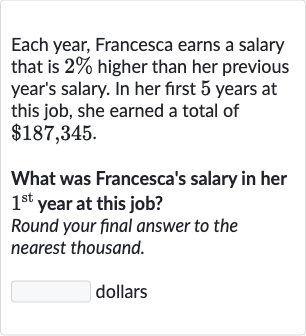AI tutor
Full solution
Q. Each year, Francesca earns a salary that is higher than her previous year's salary. In her first years at this job, she earned a total of .What was Francesca's salary in her year at this job?Round your final answer to the nearest thousand.dollars
- Determine growth type: Determine the type of growth Francesca's salary undergoes.Francesca's salary increases by each year, which is a form of exponential growth.
- Denote Francesca's salary: Let's denote Francesca's first year salary as . Each subsequent year, her salary is more than the previous year. This can be represented as , , , , and for the first five years.
- Calculate total salary over years: The total salary over the first five years is the sum of the geometric sequence:
- Solve equation for sum of geometric series: To find , we need to solve the equation for the sum of a geometric series: $S \times [\(1\) + (\(1\)+\(0\).\(02\)) + (\(1\)+\(0\).\(02\))^\(2\) + (\(1\)+\(0\).\(02\))^\(3\) + (\(1\)+\(0\).\(02\))^\(4\)] = \$\(187\),\(345\).
- Calculate sum of geometric factors: Calculate the sum of the geometric factors: \(1 + (1+0.02) + (1+0.02)^2 + (1+0.02)^3 + (1+0.02)^4\).\(\newline\)\(1 + 1.02 + 1.02^2 + 1.02^3 + 1.02^4 = 1 + 1.02 + 1.0404 + 1.061208 + 1.08243264 \approx 5.20404064\).
- Find value of S: Now, divide the total salary by the sum of the geometric factors to find S: \(\$187,345 / 5.20404064\).
- Round final answer: Perform the division to find the value of S: \(\$187,345 / 5.20404064 \approx \$35,994.82\).
- Round final answer: Perform the division to find the value of S: \(\$187,345 / 5.20404064 \approx \$35,994.82\). Round the final answer to the nearest thousand as instructed: \(\$35,994.82\) rounded to the nearest thousand is \(\$36,000\).
More problems from Exponential growth and decay: word problems
QuestionGet tutor help
QuestionGet tutor help
QuestionGet tutor help
QuestionGet tutor help
QuestionGet tutor help
QuestionGet tutor help
QuestionGet tutor help
QuestionGet tutor help

